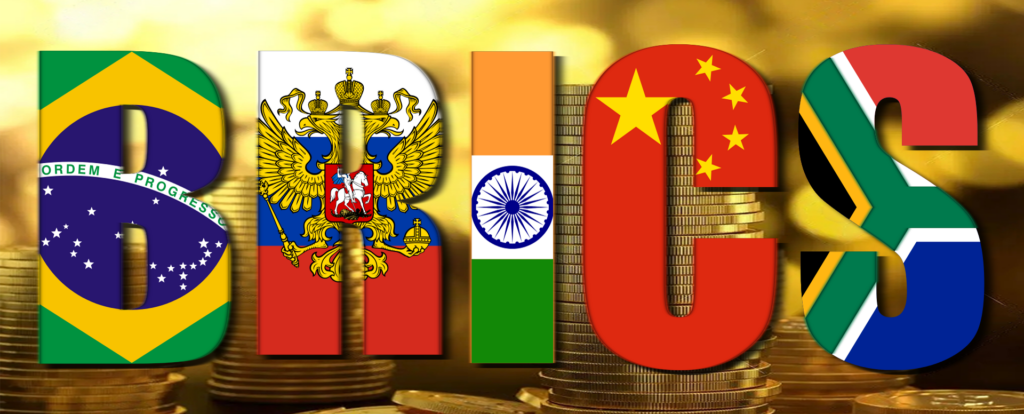Digital Zeitgeist – BRICS Alliance on the Cusp of a Gold-Backed Currency: A Revolutionary Shift in Global Financial Architecture
The international financial system, long underpinned by the US dollar, is bracing for a significant shakeup. The BRICS (Brazil, Russia, India, China, and South Africa) alliance, often considered a counterweight to Western economic hegemony, has raised a prospect that could disrupt the established order: a new gold-backed trading currency. The geopolitical ramifications of such a move are immense, as it could significantly alter the global economic landscape and undermine the US dollar’s privileged position as the world’s reserve currency.
A statement last week from the Russian Embassy in Kenya ignited global speculation. It stated, “The BRICS countries are planning to introduce a new trading currency, which will be backed by gold.” Despite natural scepticism towards announcements from Russian sources, given the current political tensions, the news has been validated by independent analysts who anticipate BRICS will forge ahead with de-dollarisation, with gold expected to play a pivotal role in this process. An announcement detailing this new currency framework is speculated to be made at the forthcoming BRICS summit scheduled for next month in South Africa.
However, don’t expect major powers like China to abandon the Federal Reserve note “dollar” in international trade immediately. There exists, as of now, no single, universally preferred alternative. Leslie Maasdorp, Vice President of the BRICS New Development Bank, observed, “It’s going to take a very long time for currency movements to take shape so any discussion of alternate currencies is indeed a much more medium and longer-term aspiration.”
Despite this, the trend of de-dollarisation isn’t a mere pipedream. Federal Reserve notes as a proportion of foreign reserves have been witnessing a steady decline over the past few years. Russia, specifically, has been driven to explore alternatives to the dollar following its exclusion from the SWIFT international payments regime.
Other countries have registered this retaliatory blacklisting, unprecedented even during the Cold War, and have been repatriating their gold holdings as a safeguard against potential future sanctions.
Meanwhile, China, the world’s second-largest economy, seems ready to retaliate against the US as well. The Biden administration’s description of China’s Xi Jinping as a “dictator” drew ire from the Chinese Communist Party. In response, China enacted export controls on critical commodities, including rare earth metals, which are essential in high-tech and energy applications, and for which the US is almost entirely reliant on China.
Treasury Secretary Janet Yellen made overtures to Beijing, advocating the continued trade relationship between the two powers rather than succumbing to adversarial positioning. Implicit in her appeal was an understanding that any Chinese move to abandon the US dollar and shift to an alternative gold-backed currency could exacerbate hostilities.
Nonetheless, the Biden administration remains virtually powerless to prevent China, its trading partners, or other countries from accumulating gold as monetary reserves. The mere fact that gold is under consideration by BRICS as a basis for international trade should be a wake-up call for central banks and individual investors to invest in precious metals. If gold’s role as a global alternative currency is set to rise, its price will likely follow suit.
The Devil’s Advocate Perspective
While it’s a transformative notion, the introduction of a gold-backed currency by BRICS is not without its potential pitfalls and disadvantages. From a macroeconomic perspective, while a gold-backed currency could provide a safeguard against inflation, it may also result in less flexibility for monetary policy adjustments, potentially exacerbating economic downturns.
Also, the geographical and geopolitical concentration of gold reserves might introduce new dynamics into global power politics. South Africa and Russia, both BRICS members, are among the top 10 nations in terms of gold reserves. The shifting of economic power and influence towards these nations could destabilise the current global order, causing further geopolitical tension.
On a practical level, implementing a gold-backed currency will be logistically challenging. The process of storing, transporting, and verifying physical gold reserves is complicated and expensive. Additionally, robust safeguards would need to be established to prevent fraudulent activity and ensure the integrity of the gold-backed currency system.
The potential for increased tensions between the US, China, Russia, and other global powers is another significant concern. A gold-backed BRICS currency could provide these nations with substantial leverage in their international dealings, and this could result in a further escalation of geopolitical tensions.
A gold-backed currency could also face a backlash from nations that are highly invested in the current dollar-dominated system. If a substantial portion of international trade shifts to a new gold-backed currency, it could result in significant financial instability and uncertainty.
Moreover, there are doubts regarding the readiness and willingness of other countries to accept a new global reserve currency. A rapid transition to a gold-backed currency could cause economic upheaval in nations that are not part of the BRICS alliance, and particularly those heavily reliant on the US dollar.
In conclusion, while the introduction of a gold-backed currency by the BRICS nations could potentially reshape the global financial architecture, it is a decision fraught with substantial risks and challenges. It will be critical for global stakeholders to carefully evaluate these potential pitfalls and prepare accordingly. While the geopolitical implications are substantial, the potential for a more multipolar global financial system might just be the shot in the arm the world economy needs in these turbulent times. However, the journey towards such a paradigm shift promises to be anything but smooth.
Disclaimer: The views and opinions expressed in this article are those of the author and do not necessarily reflect the official policy or position of GPM-Invest or any other organisations mentioned. The information provided is based on contemporary sourced digital content and does not constitute financial or investment advice. Readers are encouraged to conduct further research and analysis before making any investment decisions.

